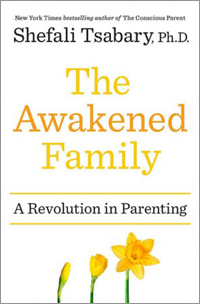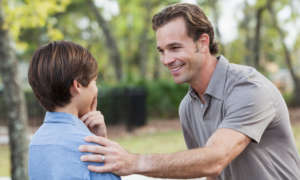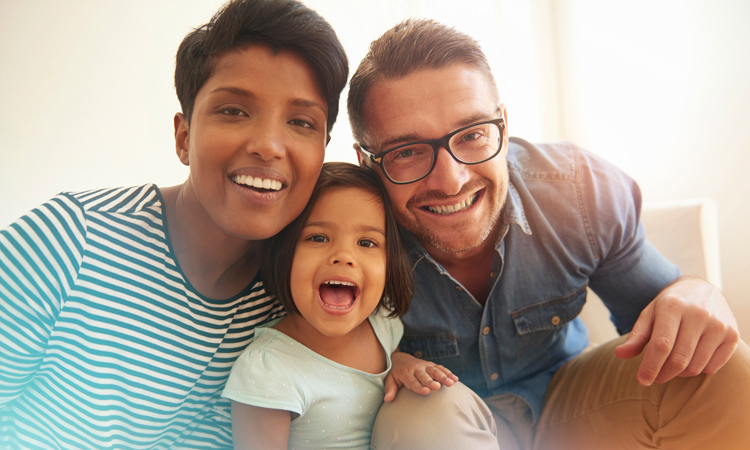My children are entering their teen years, which is completely new territory for me. Of course I’m thrilled to watch them grow up, but like any parent, I worry. I remember being a teenager—the excitement, the challenges, the drama—it was quite a ride. I want my children to have an easier time than I did, and I want to support them as best as I can during this difficult transition in their lives.
 I recently had the opportunity to talk to Dr Shefali Tsabary about her new book, The Awakened Family, and how to build a strong, healthy relationship with your children so they can thrive. In this interview, she reveals the keys to become a fully present and conscious parent.
I recently had the opportunity to talk to Dr Shefali Tsabary about her new book, The Awakened Family, and how to build a strong, healthy relationship with your children so they can thrive. In this interview, she reveals the keys to become a fully present and conscious parent.
Your first book, The Conscious Parent, has been endorsed by Oprah Winfrey as one of the most profound books on parenting she has ever read. You say becoming a conscious parent requires looking deep within ourselves first. What advice do you have for parents afraid of facing their own fears?
I tell parents that if they don’t become aware of their own “unconscious emotional baggage,” this will seep onto their children and cause them to carry those fears. No parent wishes this for their children. Once parents understand the need to constantly look deep within ourselves, we will learn to react less from a place of our own agendas and more from a place that is in touch with who it is our children truly are. From this space, we are then able to forge intimate and connected relationships to them.
In your new book, The Awakened Family, you say change starts with the parent’s behavior, not the kids. Can you elaborate on this?
Just like we don’t like to be fixed and controlled in the work place, in our marriages or by our friends, so it is with our children. The moment we enter the relationship with our children with the attitude that it is them who need to change, we automatically create a dysfunctional hierarchy based on control, fear and shame. However, when we shift into the realization that it is we who can change the conditions in our home – and our own reactions toward our children – then we release them from carrying the onus of the change.
We ask ourselves, “What can I change about myself or the conditions in my home, so that my child can thrive?” This turning of the spotlight within brings with it many wisdoms and insights for parents, which create immediate shifts in their relationships with their children.
 Conflicts with our kids are inevitable. As parents, how can we calm down when we’re feeling impatient and angry? As you say, “finding the zen in the tantrums…”
Conflicts with our kids are inevitable. As parents, how can we calm down when we’re feeling impatient and angry? As you say, “finding the zen in the tantrums…”
We tend to view conflicts as negative and try our best to avoid them at all costs. What if we looked at conflicts as opportunities for greater awareness, understanding and intimacy? The first step, of course, is to be aware in the exact moment you are in a conflict. Without a pause and reflection, we will simply react to the situation based on old belief systems.
In our fears of confrontation, we may simply shut down and withdraw, all the while holding a grudge. Instead, it is important to do the following: 1) view conflict as inevitable; 2) see the golden opportunities present in a conflict; 3) not get threatened by it and shut down; 4) open the heart and engage in a heartfelt dialogue where both parties speak of their belief systems, feelings and how their old life scripts were getting in the way; 5) find a win-win situation for both to emerge from.
In your private practice, you work with couples and families. What are some of the common issues that parents come to you with? What do you believe is at the root of most parental anxiety?
Most parents are stuck in an abyss of fear. They view their children through the lens of lesser-than-ness and constantly feel pressured to “fix” their kid in some way. Inevitably, they push their children to succeed in some way or another. Achievement then becomes a source of great pressure for their children, but the parents hold much of this weight, too.
Stressed out, over-scheduled and over-managed, our children grow up to be less connected to their inner voice, sense of joy and love for life than they do worrying about their next big test and what college they will end up in. It is only when we parents shed this fear around our children’s present and future that we will be able to engage with them with boundaries, yes, but not with a manic need to control them so that we can fulfill our fantasies about their future.
 Can you explain why traditional means of discipline don’t work? What’s the key to raising well-behaved children?
Can you explain why traditional means of discipline don’t work? What’s the key to raising well-behaved children?
The traditional means of discipline follow the hierarchical model, which places unbridled and unchecked control in the hands of the parent. In this model, parents get to arbitrarily decide how to react to their children any time their children make them upset. Quite often, we use nonsensical ways to teach our children.
For example, we give two-year old time outs without even being aware that these things don’t teach a young one anything, except for shame and fear. Instead, we need to understand that one-third of our children’s behaviors emerge from a lack of skill, the other one-third from a lack of our clarity around how to lay clear limits and the last one-third from an upsetness of feelings within the child.
In each of these cases, we the parents need to step in and figure out what is needed. Shame, threats, yelling and punishments only create fear, shame and resentment within the child and don’t get to the root of the issue, which is something far deeper. When parents approach the sacred task of teaching their children without the tactics of control and manipulation, they help their child discover their own powers for self-discipline and negotiation, which by itself creates greater buy-in on the part of the child and also, a deeper connection with the parent.
If you could give parents one piece of advice what would it be?
The one piece of advice would be this: parenting is a joyful relationship where you can learn more from your children, much more than you can ever aspire to teach them. When you are willing to enter this relationship as a student, you will use every moment with your child – and there will be plenty – to grow and enter your highest state of consciousness. In this way, parenting becomes the portal for your highest transformation and change. What a wonderful opportunity this is indeed!
You’ve worked with Goldie Hawn’s MindUp Foundation, Kids in the House and many educational centers around the world. What’s the biggest transformation or most inspirational thing you’ve seen?
I see how conscious parenting is taking root, with more and more parents willing to see their children as mirrors to their own immaturities and emotional conditioning. Instead of using their children to make them feel better, parents are more willing to change themselves so that their children can be set free to unfold into their most authentic selves.
To buy The Awakened Family by Dr Shefali Tsabary, click here.

Rose Caiola
Inspired. Rewired.


